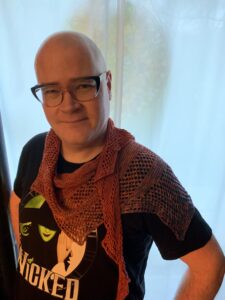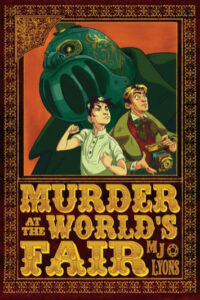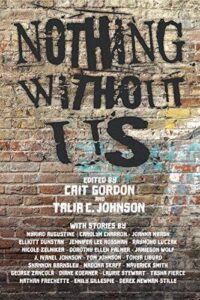SF Canada is pleased to share a new interview from Derek Newman-Stille. They chatted with fellow SF Canada member Marie Bilodeau to find out what it’s like to write horror, as well as multiple speculative genres.
Interview with Marie Bilodeau on Writing Horror and Loving She-Ra
By Derek Newman-Stille
Derek Newman-Stille: “To start out our interview, can you tell readers a little bit about yourself?”
 Marie Bilodeau: “I like to dabble in various genres of writing – I write science-fiction, fantasy, and horror, in both long and short forms. I’m also a professional storyteller, which means I stand up in front of audiences and tell either old tales, adapted ones, or some original works. Aside from that, I’m an event manager, a cupcake-lover, have many fluffy cats and love She-Ra. Perhaps am *in* love with She-Ra. …I think that pretty much covers it all.”
Marie Bilodeau: “I like to dabble in various genres of writing – I write science-fiction, fantasy, and horror, in both long and short forms. I’m also a professional storyteller, which means I stand up in front of audiences and tell either old tales, adapted ones, or some original works. Aside from that, I’m an event manager, a cupcake-lover, have many fluffy cats and love She-Ra. Perhaps am *in* love with She-Ra. …I think that pretty much covers it all.”
Derek: “Can you tell us a little bit about what it’s like to write across so many genres?”
Marie: “Certainly! It’s amazing! So, each genre is very firmly speculative fiction, meaning that there’s an element in it (usually in the world) that’s not quite of our world. It’s that worldbuilding aspect that I thoroughly love. In fantasy, you get to hurl fireballs. In science fiction, you can have space ships! In horror, monsters lurk in the shadows. And, best of all, you can have all of those things in the story and let the market figure it out!”
Derek: “Your science fiction often takes on horror elements as does your fantasy (I’m thinking specifically about your fairy tale work) – what generated your interest in horror and do you notice elements of it in your other work?”
Marie: “Horror is an amazing tool, because it’s so versatile. It can frighten, shock, repulse…it doesn’t matter, as long as it draws a reaction, often a visceral one. In my fairy tale inspired serialized novel, Nigh, I used horror in the tradition of fairy tales, often to warn, or correct behaviour. Which meant it also took on tones of existential horror, which you get at the heart of some stories, like Sleeping Beauty. Sure, she gets woken up. But, wait, she’s been sleeping for how long? Her world is gone? Not to mention all the other stuff that happens, depending on the version. That thread of horror isn’t often outright stated, but the reader often experiences it on an existential level. I have a short story coming in Jennifer’s Brozek’s 99 Tiny Terrors this year. It’s purely existential. Nothing happens except making tea and chatting with an old friend. But it’s visceral in what the reader knows, regardless of how the characters deal with it. That’s what makes horror so wonderful. It’s visceral, and often relies on universal experiences and archetypes to hit its target: the human heart.”
Derek: I can’t wait to read it!! I love existential horror! Horror has this amazing ability to unsettle the ordinary. Do you tend to use it to unsettle things and open unquestioned things up to questions?
Marie: “Definitely! With horror, as with any genre, you can get your reader to really question their own worldview (or find it reinforced!) But, to make it successful, the trick (which isn’t always easy to pull off), is not to outright state what you’re questioning. You have to craft the story in such a way that the reader ends up asking the question. That’s when you know you’ve hit home. The reader incorporated the story enough, lived in it, even in a brief piece of flash fiction, to inhabit it and see what was provided and, more importantly, what wasn’t mentioned at all. It means the story is now part of the reader, in the questions you’ve forced them to face. It’s one of the genres that benefits the most from a fine glitter dust highlighting just the right details.”
Derek: Relatedly, one of the things that I love about your sci fi is that no matter how alien your aliens are, they fundamentally say something about what it is like to be human. Can you tell us a bit about how you use the alien to comment on human experiences?
Marie: “That’s one of my favorite things! First, aliens are super fun to build! Like, how will you work? What culture propels you? What part of history got you to this point? How do you eat your food? DO YOU EVEN EAT! OMG you like music? But only as it shifts the tectonic plates of your volcanic world? BE MY VALENTINE, you amazing alien you!
…But I digress. Aliens and different societies allow us freedom from current political, cultural and religious human realities and offers a blank canvas upon which to draw our tale. I especially love using them in my short stories. For example, my “Out-of-Worlds-Planet-Cessation Extravaganza” story in Amazing Stories is funny with cool aliens and solid event management techniques, but it’s all about how the “bling” of things can get in the way of basic humanity. In my Analog short story “Molecular Rage,” I wanted to show how someone not fitting in due to random (and cruel) determinations can hurt not just the ostracized individual, but their entire family and culture. Also, how it’s generally a shitty thing to do.
Both those things could have been done in our world, with plenty of examples to (sadly) go around, but often I find the reader to be more receptive to something when they don’t start putting up personal listening walls because of their own set of beliefs.
It’s a flip from horror, in a way. In horror, you want to use the visceral common experience to strike home. Whereas in this case, striking home means taking them out of a common experience by placing them amongst aliens, and using shadows of our world to keep the darkest places familiar. The reader can then cast their own light there, and come to their own conclusions.”
Derek: Do you find that your stories are influenced by current issues and events? What are some events that have inspired you to fictionalize them and imagine their possibilities in other worlds?
Marie: “Definitely! Okay, so there are the Big Ideas and Big Events, which I think lots of people tackle super well and because they’re big ideas, lots of people use them in their fiction. They’re thematic, and often should be!
What I love best, however, are small ideas. I love taking things that amuse me, fascinate me, just make me damn curious, and writing about those.
For example, the Fyre Festival was an amazing failure of event management. I watched it go down live, glued to my screen in fascination. When the two documentaries came out, we invited friends over, made tiny cheese and arugula open-faced sandwiches for snacks, and watched them back-to-back. They created a fuller picture which was amazingly bad. I laughed, and flinched, so much. Anyway, out of that came the idea for “Out-of-Most-Worlds Planet Cessation Extravaganza.” It wasn’t a retelling of the Fyre Festival (nothing could top the original!), but it was inspired by it. A small idea, about bling blinding event managers to the impact of their vision (in this case, how it affected the island inhabitants).
It’s a small thread in a giant messy ball of crazy yarn that I pulled out of that story, but it worked for my writing voice.”
Derek: “What are some of the other small ideas that have influenced some of your work?”
Marie: “I lump family stories into small ideas (because they have a more personal reach, I suppose?), and have used quite a few in my works! Nigh is a bit of a retelling of one of my family legends, for example. My Irish great grandmother, Mary Grant, had a sister named Alexandrine (or cousin? Some close relative, anyway). My dad gave me Alexandrine’s old pocket watch a few years back, along with its mystery. We know she was engaged to the gentleman who gave her this watch, but they were never married. And we have no idea why. She kept this watch to her dying day (after a long life) and passed it down the family line until it became mine. Why would she keep it? Did the young man die? Did he vanish? What happened?
Out of that family legend I imagined Hector Henry Featherson, a World War I soldier in the throes of PTSD who steps into a fairy circle a hundred years ago only to step back out now, finding his world and love gone, but still able to make a difference…
I see those little ideas as more personal, I suppose, and more unique to each individual.”
Derek: I love the way an object can inspire a story. I know that Ray Bradbury used to use objects around his office to inspire stories. Do you find that you often use objects as inspiration for new narratives?
Marie: “I love ephemeral objects as part of my writing process. Things that are here for the duration of the story. A marked change in my writing space, welcoming the new story to tea. For the Destiny series, my main character was a florist, and I’d get flowers for my writing room. For some stories, I just change the lights on my keyboard to a specific pattern (I have a fast and fancy gaming keyboard). I used to switch locations completely at times, like going to a convent to write (when leaving the house was a thing). Failing that, I now cater my little writing space for each story. So, I guess it’s not so much as items necessarily inspiriting the tale, but more items helping to create the right atmosphere for the story.”
Derek: You mentioned that you also do storytelling work. How has the current pandemic climate changed that kind of work for you?
Marie: It’s honestly blown it completely up! There are online storytelling gigs, but love having the audience in the room with me. They’re a part of the story. Their reactions inform how I tell the story. Their energy feeds me. I’d prefer waiting for those moments of magic to be possible again then try to capture a fraction of it online. Some people pull it off spectacularly well! But it’s not the teller I am. I’m hoping that vaccinations will make spooky tellings possible this fall. It’s my favourite telling time of the year!
Derek: You know I have to ask about your love of She-Ra. What inspired your adoration of her and has she inspired any characters in your own stories?
Marie: “I loved watching She-Ra as a teen. She was kickass, wore heels and a cape, was kind and a healer, fought an evil empire, rode a magical flying unicorn…what more could I ask for??? I loved that she represented strength, while still being feminine. That she wielded a sword and still healed. It was an example I desperately needed and craved as a kid. And I was just as inspired by the new She-Ra!
I haven’t based a character on her per say, but she inspires that dichotomy, that contrast in characters. No one is all good or all bad. Even warriors can have a soft touch. And everyone deserves a winged unicorn (though I’ve yet to write one in a story).
Derek: As we finish up our interview, is there anything you want to add or tell readers about yourself? Are there any current projects you are working on that you can tell us about?
Marie: The third book in The Guild of Shadows series, Hell Bound, is currently available for preorder, and it’s going to be another crazy fun adventure. With lots of death, but lots of giggles, too! I’ve also got another project I love, Wishstamp, which I invite you all to check out (www.wishstamp.com).
Marie Bilodeau is an Ottawa-based author and storyteller, with eight published books to her name. Her speculative fiction has won several awards and has been translated into French (Les Éditions Alire) and Chinese (SF World). Her short stories have also appeared in various anthologies. In a past life not-so-long ago, she was Deputy Publisher for The Ed Greenwood Group (TEGG). Marie is also a storyteller and has told stories across Canada in theatres, tea shops, at festivals and under disco balls. She’s won story slams with personal stories, has participated in epic tellings at the National Arts Centre, and has adapted classical material.
Derek Newman-Stille, MA, PhD ABD (They/Them) is a Disabled, Queer, Nonbinary activist, author, artist, academic, and editor. They edited the anthologies Over the Rainbow: Folk and Fairy Tales from the Margins (Exile) and We Shall Be Monsters (Renaissance Press) and are the 8 time Prix Aurora Award-winning creator of the digital humanities hub Speculating Canada. Derek has published in fora such as Uncanny Magazine, The Playground of Lost Toys, Quill & Quire, Fireside Magazine, Diamond Book Shelf, The Town Crier, Exile Quarterly, and Nothing Without Us. Derek’s art work has been published in fora such as Feminist Space Camp, Lackington’s, Postscripts to Darkness, and Aging Activisms.








